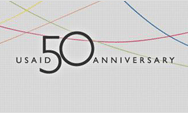 |
|
 |
 |
 |
- 05/12/12: Commencement Address by Dr. Rajiv Shah, USAID Administrator, at the School of International Service, American University
- 05/11/12: Baccalaureate Address by Dr. Rajiv Shah, USAID Administrator, at Tuskegee University
- 05/08/12: Remarks by Nancy Lindborg, Assistant Administrator, Bureau for Democracy, Conflict & Humanitarian Assistance, at the International Food Aid and Development Conference - The Role of U.S. Food Assistance in Building Resilience
- 04/30/12: Remarks by Donald K. Steinberg, Deputy Administrator, at the Interaction Forum 2012 - The Democratization of Development
- See all USAID Speeches and Testimony
 RSS Feed for Recent USAID Speeches and Testimony RSS Feed for Recent USAID Speeches and Testimony
|
|
 |
 |
|
Remarks by Donald Steinberg
Deputy Administrator, USAID
Presentation to Bush Institute Egyptian Fellows
Meridian House
Washington, DC
February 23, 2012
[As Prepared]
It's a great honor to be able to welcome the first group of Bush Institute Egyptian Fellows to Washington. You bring with you a wealth of experience in the arenas of education, health, business, politics, law and the media. You have achieved so much in your lives already - I understand that one of you is actually only 23 years old. I'm humbled. But then again, it is a sobering thought to think that when he Mozart was my age, he had been dead for 23 years.
Your accomplishments are even more impressive when seen against the backdrop of a difficult environment for women's achievements in Egypt in the political, social and economic areas. Regrettably, the disparity in opportunities for women in Egypt is stark, notwithstanding a period of rapid economic growth over the past years and the recent political openings since the departure of Mubarak. Women are barely represented in the new parliament; they suffer a 40 percent unemployment rate; and the illiteracy rate for women is nearly twice as high as that of men.
I had the privilege to travel to Egypt not so long ago, and one of the first meetings I held was with women political and economic leaders. They delivered to me a strong message on the need for inclusion and a purposeful approach toward gender equality and women's empowerment. They said that there is are nascent but promising networks of women in Egypt who need the support of the outside community, and that we could achieve much together if we all heeded their voices and advice. They reminded me that no one has a monopoly on good ideas, resources, ground truth, or moral authority. They also highlighted that the need to reach beyond the urban elites to address those living in poverty in urban settings and in the rural community. Finally, they stressed that a number of achievements in social issues over the past decades - ranging from more equitable divorce laws to actions again child marriage and female genital mutilation - needed to be preserved.
We listened. In response, we are reinforcing our efforts to support women's political, economic and social leadership, including through support for political caucuses, girls education, maternal-child health care, and women's entrepreneurship. We are supporting not just micro-enterprise, but women's engagement in small, medium and large enterprises, addressing the factors that impede such engagements, factors that include discriminatory inheritance laws, land ownership, and access to investment capital.
As a second pillar, we are working with government, civil society, and business groups to protect and empower women during this period of change. Too frequently, such periods are accompanied by an increase in sexual and gender based violence, domestic violence, child abuse, and trafficking in persons, and we are helping those institutions in Egypt that are addressing such phenomena.
Finally, we are working to mainstream gender considerations into all of our development efforts in Egypt, whether that is food security and agricultural development, health, or education. We have a world-wide requirement that every project proposal includes the equivalent of a 'gender impact statement," assessing how the project will promote the status and advancement of women and girls.
In conclusion, our work in this area has the highest possible support. Not only do we have remarkable leadership from Secretary of State Hillary Clinton and her ambassador for women's issues, Melanne Verveer, but President Barack Obama has directed us to highlight these issues. Indeed, last May, as part of his address welcoming the openings in Egypt and other nations in the Middle East, he said, "History shows that countries are more prosperous and peaceful when women are empowered. That is why we will continue to insist the universal rights apply to women as well as men - by focusing assistance on child and maternal health; by helping women to teach or start a business; by standing up for the right of women to have their voices heard and to run for office. For the region will never reach its potential when more than half its population is prevented from achieving their potential." Powerful words, and ones that guide our work.
Once again, congratulations on your engagement in the Bush Institute Egyptian Fellowship program, and best of luck during your time in the United States. Thank you.
Back to Top ^
| 



